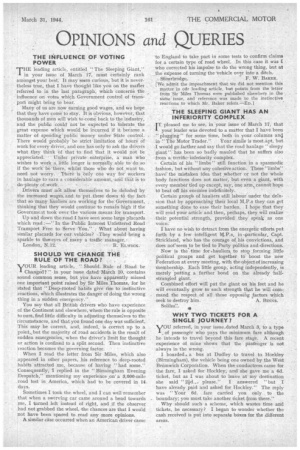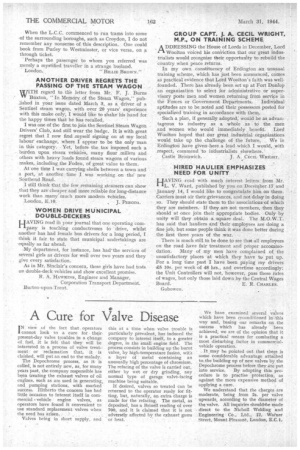OPINIONS and QUERIES
Page 31

Page 32

If you've noticed an error in this article please click here to report it so we can fix it.
THE INFLUENCE OF VOTING POWER
THE leading article, entitled The Sleeping Giant,"
• in your issue of March 17, must certainly rank amongst your best: It may seem curious, but it is nevertheless true, that I• have thought like you on the matter referred to in the last paragraph, which concerns the influence on votes which Government control of trans port might bring to bear. , Many of us are now earning good wages, and we hope that they have conle'to stay. It is obvious, however, that thousands of men will wish to come back to the industry,
and the Public could not be expected to tolerate the great expense which would be incurred if it became, a matter of spending public money under State control. There would probably be strict limitation of hours of work for every driver, and one has only to ask the drivers what they think of that 'to. find that it would Mat be appreciated. Under private enterprise, a man Who wishes to work a little longer is nornially able to do, so if the work' be 'there, whilst those who do not want to, need not worry. There' is only one way for workers in haulage to earna considerable amount, AMd tffit is to
do 'plenty of .work. • • .
Drivers must n6t allow themselves to be deluded by the increased wages. and to 'pit these down to the fact that so many hauliers are working for the' Government, thinking that they would continue to remain high if the Government 'took over the various means:for transport.
Up and down the road I have seen Some large placards which read :—" In the Public Interest Unfettered Road Transport Free to Serve You." What about having similar placards for ourvehicles? ,They would bring a sparkle to the' eyes of Many a traffic manager.
London, N.12. ' : R. EawIcK.
SHOULD WE CHANGE THE RULE OF THE ROAD?.
vOUR leading article, " Should. Rule of Road be
Changed? " in your issue. dated March 10, contains sound common sense, but yoir .haVe apparently rriissed one important point raised by Sir Miles, Thomas, for he stated that "Deep-rooted -habits give rise to instinctive reactions, 1N'hich illustrates the danger of doing the'wrong thing in a sudden emergency."
You say that all British drivers who have experience of the Continent and elsewhere, where the rule is opposite to ours, find little difficulty in adjusting themselves to the circumstances, and that you found one day was sufficient. This may be correct, and, indeed, is correct up to a pointa but the majority of road accidents is the result of sudden emergencies, when the driver's limit for thought. or action is confined to a split second, Then instinctive reaction becomes the governing factor.
When I read the letter from Sir Miles, which also appeared in other papers, his reference to deep-rooted habits attracted me, because of having "had some." Consequently, I replied in the "Birmingham Evening Despatch," mentioning my experience on a 3,000-mile road test in America, which had to be covered in 14days.
Sometimes I took the wheel, and I can well -remember that when a swerving car came around a bend towards me, I turned left instead of right, and if the observer had not grabbed the wheel, the chances are that I woad not have been spared to read any more opinions.
A similar case occurred when an American driver came
to England to take part in some tests to confirm claims for a certain type of road wheel. In this case it was I who corrected his impulse to do the wrong thing, but at the eXpense of turning the vehicle over into a ditch.
• Stourbridge, F. W. BAKER. [We admit the impeachment that we did not mention this matter in oft leading article, but points from the letter from 'Sir 'Miles Thomas were published elsewhere in -ale
• same issue, and reference was made to the instinctive reactions to which Mr. Baker refers.—En.]
THE SLEEPING GIANT HAS AN INFERIORITY COMPLEX
IT pleased me to see, in your issue of March 17, that A• your leader was devoted to a matter that I have been plugging" for some time, both in your. columns an
. in ' The' Motor Trader." Your simile is most. apt, but I would go farther and say that the road haulage '' sleepy giant" has been so badly mauled that he suffers also from a terrific" inferiority 'complex.
Certain of his " limbs " still function in a spasmodic fashion, but without any cohesive action. These "limbs" -have the mistaken idea that whether or not the whole body functions does not matter, but even a giant, with every member tied up except, say, one arm, cannat hope to beat off his enemies indefinitely.
Certain group's of hauliers still labour under the delusion that by approaching their local M.P.s they can get something done to ease their burden. I hope that they will read your article and then, perhaps, they will realize their potential strength, provided they speahi as one voice: I have no wish to detract from the energetic efforts put forth by a few intelligent M.P.s, in -particular, Capt. Strickland, who has the courage of his convictions, and does nor seem to be tied to Party politics and-directions.
Now is the time for ..hauliers to stop forming little political groups and get together to boost the new Federation at every meeting, with the abject of increasing Membership. Each little group, acting independently, is merely putting a further bond on the already tali strangled giant. , Combined effort will put the giant on his feet and he will eventually grow to such strength that he will corn'nand the respect of all those opposilig !actors which
• seek to destroy him. A. BINNS. Solihuli.411
WHY TWO TICKETS FOR A SINGLE JOURNEY?
YOU referred, in your issue,dated March 3, to a type . of passenger who pays the minimum fare although he intends to travel beyond this fare stage. A recent experience of mine shows that the passenger is not always in the wrong.
I boarded, a bus at Dudley to travel to Hoekley (Birmingham), the vehicle being one awned by the West Bromwich Corporation. When the. conductress came for the fare, I asked for Hockley, and. she gave me a 6d. ticket, but as I was about to leave at my destination
she said "24d.. please." I answered " but I have already paid and asked for Hoekley." The reply was "Your 6d. fare carried you only to the boundary; you must take another ticket from there."
Why should such a scheme, which wastes time and tickets, be necessary? I began to wonder whether the cash received is put into separate boxes for the different areas. When the L.C.C. commenced to run trams into some of the surrounding boroughs, such as Croydon, I do not remember any nonsense of this description. One could book from Purley to Westminster, or vice versa, on a through ticket.
'Perhaps the passenger to whom you referred was merely a mystified traveller in a strange busland.
London. ' BILLIE BROWN."
ANOTHER DRIVER REGRETS THE PASSING OF THE STEAM WAGON WITH regard to the letter from Mr. F. J. Burns VT Buxton, "In. Memory of the Steam Wagon," published in your issue dated March 3, as a driver of a Sentinel steam wagon, with over 20 years' experience with this make only, I would like to shake his hand for the happy times that he has recalled.
I was one of the first to join the Sentinel Stearn Wagon Drivers' Club, and still wear the badge. It is with great regret that I now find myself signing on at my local labour exchange, where I appear to be the only man in, this category. Yet, before the tax imposed such a
• burden upons steam vehicl6s, many flour millers and others with heavy loads found steam wagons of various makes, including the Foden, of great value to them. Atone time I was carrying shells between a town and a port, at another time I was working on the' new Southend Road. • I still think that the few remaining steamers can show that they are cheaper and more reliable for long-distance work than many much more modern tehicles.
London, E.10. J. PERODA.
WOMEN DRIVE MUNICIPAL DOUBLE-DECKERS
HAVING read ili your journal that one operating corn"party is teaching conductresses to drive, whilst another has had female bus drivers for a long period, I think it fair to state that municipal undertakings are equally as far ahead.
.My department, for instance, has had the services of several girls as drivers for well over two years and they give every satisfaction.
As in Mr. Sinclair's concern, these girls have had tests on double-deck vehicles and show excellent promise. R. A. “AWKINS, Engineer and Manager, Corporation Transport Department. Burton-upon-Trent. -GROUP CAPT. J. A. CECIL WRIGHT,
• M.P., ON TRAINING SCHEME.
A DDRESSING the House of Lords in, December, Lord Woolton voiced his coni7iction that our great industrialists would recognize their opportunIty to rebuild the country when peace returns.
• In my own constituency of Erdington an --unusual training scheme, which has just been announced, comes as practicalevidence that Lord Woolton's faith, Was wellfounded. There has already been set up•at Fort Dunlop an organization -to Select for administrative or supervisory posts Men: and women returning from service in the Voices or Government Departments. Individual. aptitudes are to be noted and their possessors posted for specialized training in accordance with them.
Such a plan, if generally adopted, would be as advantageous, to industry as a whole as tic; the men and women who would • immediately 'benefit. .L6rd Woolton hoped that our great industrial organizations would take up the challenge of the future. We in .Erdington have given,here. a lead -which I would, with respect, commend "to industrialists ,elsewhere'.
Castle Bron:iyeich. • J. A. CECIL• WRIGHT.
HIRED HAULIER EMPHASIZES NEED FOR UNITY
HAVING read with much interest letters.'.from Mr. L. V. Ward, published by you on Deceinber.17.and • January _14, I would like. tO congratulate him on them. Carriers must air their.grievances, and not delay in doing so. They should state them to the associations ,of which they are members. If they are not members, then they .should at once join their appropriate bodies. Only by unity will they obtain a .square deal. The M.O.W.T. has said that hauliers and their employees are .doing a fine job, but some people think it was done better during the first three years of the war. .
There is much still to be done to see that all employees onthe road have fair treatment and proper accommodation. Many of my men have complained of the unsatisfactory places at which they have to put up. For a long time past I have been paying my drivers 45 10s. per week of 48 hrs., and 'overtime accordingly; the Unit Controllers will not, however, pass these rates of wages,. but only those laid down by the Central Wages
Board. E. R. CHARLES. Goboweit




















































